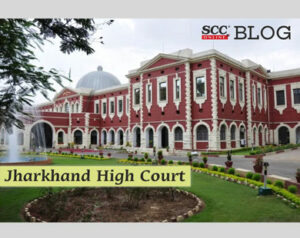Jharkhand High Court: In a Second Appeal against the reversal of Trial Court’s decision in a Title Suit for partition of share and separate possession, Sanjay Kumar Dwivedi, J. set aside the reversal of Trial Court’s decree and restored the matter to be decided afresh. The Court held that the ingredients of Section 50 of the Evidence Act, 1872 have not been fulfilled for proving the relationship of a mother and son.
Understanding the facts of the present matter, a Title suit was instituted for partition of half share of the plaintiff (hereinafter ‘X’) and separate possession. The Trial Court vide judgment dated 01.10.1985 dismissed the suit and held that ‘X’ is not the son of deceased- mother since natural corollary follows that deceased died issueless. The matter was appealed before the Additional District Judge wherein, the Trial Court’s decree was modified, and ‘X’’s suit was decreed in part which held that the ’X’ was entitled to a decree of partition to the extent of half share in the suit property except a small portion of the land. The decision of Additional District Judge has been appealed against in the present matter wherein, the following questions have been raised and dealt with one by one by the Court:
Question 1 – Whether the evidence of PWs 2,4 and 5 was admissible under section 50 of the Evidence Act?
The Court regarded special means of knowledge as one of the ingredients for deciding the claim of Section 50 of the Evidence Act, 1872.
Reliance was placed upon Dalgobinda Paricha v. Nimai Charan Misra, 1959 Supp (2) SCR 814 wherein, the witness possessed some special knowledge of the conduct of parties for having attended a few ceremonies, and that is where Section 50 of the Evidence Act comes into play, as held by the Supreme Court. Referring to DW 4, who admitted to not having attended deceased’s marriage and being unknown to the birth of X, completely bereft of any special knowledge, the Court held that the said evidence did not come within the purview of section 50 of the Evidence Act. The Court pointed out that the dispute is arising from the relationship of mother and son, and the above scenario falls akin to the evidence of three other PW No. 2, 4 and 5. It was held that the evidence of witnesses were not admissible for not having fulfilled the ingredients of section 50 of the Evidence Act.
The Court observed that “there is a great risk involved in solely relying on the evidence of witnesses given from pure memory because interested witnesses normally have the tendency to draw more from their imagination, or twist and turn the facts heard from their ancestors in order to help the parties for whom they are deposing.”
Question 2 – Whether ‘X’ was the son of ‘A’?
The Court referred to the principles required to be considered for close connection among the persons whose pedigree is sought to be deposed as per Section 50 of the Evidence Act and noted that the nature and character of special knowledge must be one of the parameters to consider such witnesses, one being derived under all means of special knowledge purely from imagination and that witness’s evidence must be substantially corroborated. The Court observed that since time, memory and necessary ingredients are lacking in the present matter, the documentary evidence prima facie suggests that ‘X’ was not the son of deceased.
The Court set aside the appellate Court’s order of reversal of Trial Court’s decision and restored the Title appeal for deciding the matter afresh in accordance with law.
[Sarbeswar Mahto v. Jagu Mahto, 2023 SCC OnLine Jhar 116, dated 3-01-2023]
Advocates who appeared in this case :
For Appellants: Senior Advocate R.N. Sahay, Advocate Yashvardhan, Advocate Ritesh Singh, Advocate Vishnu P. Pathak, Advocate Abhishek Piyush, Advocate Aditya Aman, Advocate Rishika Kaushik;
For Respondents: Advocate S.K. Sharma and Advocate R.K. Mahtha.

